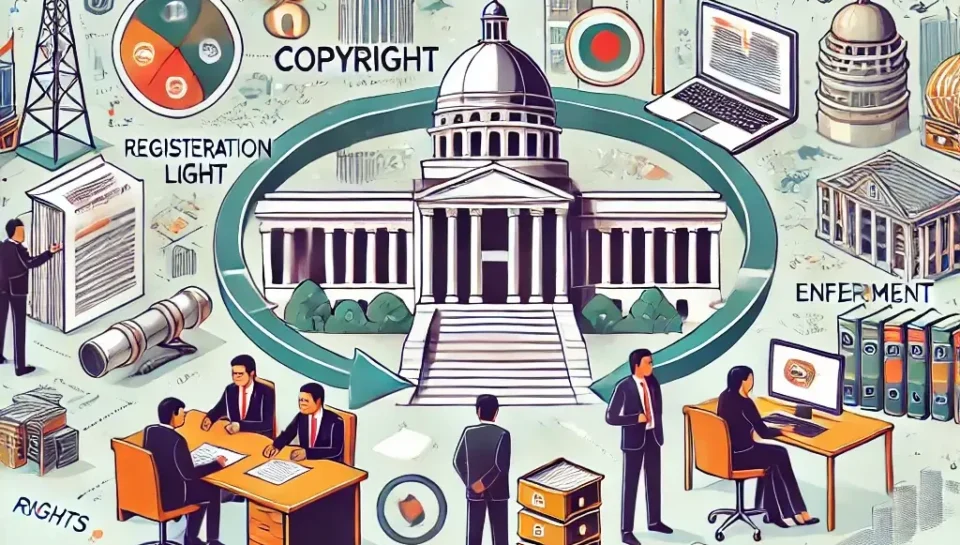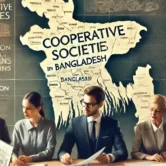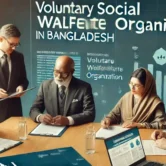Comprehensive Guide to Copyright in Bangladesh

Copyright is a crucial legal mechanism for intellectual property protection – it is also the most registered and widely sought-after legal protection and remedy.
In this article, we will discuss copyright in Bangladesh, the law governing it, how to register copyright in Bangladesh, importance of copyright in Bangladesh, copyright infringements with their remedy and punishment, etc. to make the concepts easier to understand
What is Copyright?
Copyrights protect works such as literary and artistic works like books, computer programs, plays, music, films, and paintings, etc. Copyright law protects not ideas, but their expressions. It grants the creator the exclusive rights to use, reproduce, distribute, and monetize their work while protecting against unauthorized use by others.
Copyright as per Bangladeshi Law
The Copyright Act of 2023 in Bangladesh represents a significant update to the country’s copyright legislation, replacing the previous Copyright Act of 2000. This new law is designed to enhance the protection of original works across various domains, including literature, art, music, film, digital content, and folklore.
The Copyright Act, 2023 is the main law governing copyright in Bangladesh. Section 2(11) the Copyright Act, 2023, gives definition of “Work” – refers to the following individual or collective creations:
(a) Literature, drama, music, and artwork;
(b) Cinematographic films;
(c) Sound recordings;
(d) Broadcasts;
(e) Performances;
(f) Architectural designs or models;
(g) Databases;
(h) Information technology-based digital works; and
(i) Folklore or expressions of folk culture.
According to Section 2(7) the Copyright Act, 2023:
“Copyright” refers to the authority to perform or reproduce any work or a significant part of a work in the following ways. This also includes related rights:
ক – ka. For literary, dramatic, musical, or folk works:
অ – a). Reproducing or preserving copies of the work in any form, such as handwritten, electronic, digital, or any other format that is audible, visible, or comprehensible.
আ – aa). Publishing copies of the work to the public, excluding those already in circulation.
ই – i). Performing the work publicly or communicating its audible, visible, or comprehensible copies to the public or consumers through any means.
ঈ –ee). Producing, reproducing, editing, or publishing a translation of the work.
উ – u). Making films or sound recordings based on the work.
ঊ – uu). Broadcasting the work or communicating its broadcasted content to the public using microphones or similar devices.
ঋ – ri).Adapting the work.
এ –e). Performing any action from (a) to (ri) concerning translations or adaptations of the work.
খ – Kha. For information technology-based digital works:
অ – a). Any of the acts referred to in Sub-section (ka).
আ – aa). Selling, renting, or licensing copies of the digital work-information technology, whether or not such copies were previously sold or rented, or offering such services.
গ -Ga. For artistic works:
অ – a). Reproducing the work in any form, including transforming it from one-dimensional to multi-dimensional (e.g., two-dimensional, three-dimensional, four-dimension, etc.).
আ – aa). Distributing the work to the public.
ই – i). Issuing copies of the work to the public, excluding those already in circulation.
ঈ –ee). Including the work in a film.
উ – u). Adapting the work.
ঊ – uu). Performing any action from (a) to (ee) concerning adaptations of the work.
ঋ – ri). Broadcasting the work or communicating it to the public using microphones, digital technology, or similar methods.
ঘ – Gha. For films:
অ – a) Reproducing any portion of the film, including photographic frames, through VCP, VCR, VCD, DVD, digital means, or any other method or medium.
আ – aa). Regardless of whether such copies have been previously sold or rented, engaging in the sale, rental, or offering for sale or rental of film copies in the form of VCP, VCR, VCD, DVD, digital methods, or issuing licenses for such activities or preserving, transporting, marketing, or publicly exhibiting the film copies for commercial purposes.
ই – i) Broadcasting or exhibiting a film’s audio or visual copies through VCP, VCR, VCD, DVD, VTR, cable, satellite channels, mobile phones, the internet, digital platforms, or any other method for public dissemination and display.
ঙ- nga) For sound recordings:
অ – a). Producing duplicates of sound recordings, including identical reproductions, using electronic or other methods.
আ – aa). Regardless of whether similar copies have been previously sold, licensed, or rented, engaging in the sale, licensing, or rental of any sound recording copies, or offering the same for sale or rental.
ই -i). Broadcasting or publicly disseminating recorded sounds through any medium.
Features of Copyright
Pros of Copyright Registration
Automatic Protection: Copyright protection arises automatically upon the creation of a work; registration is not mandatory but highly beneficial.
Exclusive Rights: The creator controls reproduction, distribution, public performance, and adaptation of their work.
Duration of Protection: Generally, copyright lasts for the creator’s lifetime plus 60 years after their death.
Global Recognition: As a member of the Berne Convention, Bangladesh’s copyright protections extend internationally in member countries.
Exceptions: Fair use provisions allow limited use of copyrighted works for purposes such as education, research, and criticism.
Legal Proof: Registration serves as evidence of ownership in case of disputes or infringement.
Monetary Benefits: It enables licensing or selling rights for royalties or profits.
Infringement Protection: Registered works have stronger legal backing for enforcement.
Global Validity: Facilitates international protection in Berne Convention member countries.
Business Credibility: Shows professionalism and enhances brand value.
Cons of Copyright Registration
Cost: Registration involves fees that might be burdensome for small creators.
Time-Consuming: The process may take several months to complete.
Not Mandatory: Copyright arises automatically, so registration is optional.
This Comprehensive Guide to Copyright in Bangladesh will safeguard your creative works, ensuring legal protection and exclusive rights. However, businesses looking to protect their brand identity should consider trademark registration, while those with unique inventions can benefit from patent registration to secure exclusive ownership.
Step-by-Step Guide to Copyright Registration in Bangladesh
The Department of Patents, Designs, and Trademarks (DPDT) under the Ministry of Industries is the responsible authority for administering copyright-related matters in Bangladesh. Bangladesh Copyright Office, Ministry of Cultural Affairs, Plot No. F20/B, West Agargaon, Sher-e-Bangla Nagar Administrative Area, Agargaon, Sher-e-Bangla Nagar, Dhaka-1207. Website: www.copyrightoffice.gov.bd . Phone: +8801511-440044, +8802-48115386. Email: info@copyrightoffice.gov.bd
Accessing the Online Application
Visit the official website of the Bangladesh Copyright Office: www.copyrightoffice.gov.bd.
Click on the “enter (প্রবেশ করুন)” option to proceed.
For login, first click on the “Sign In” button, then select “Register.”
Complete the registration process by providing the required information.
After successful registration, use your email/mobile number and password to click on the “Sign In” button and access the application form.
If needed, refer to the “Completed Form and Guidelines” before applying.
Required Attachments for Part 1 of the Application
Scanned Attachments of the following:
a. Treasury Challan of BDT 1,000.00 per application deposited in the code (treasury challan) 1-3437-0000-1841 at any branch of Bangladesh Bank/Sonali Bank Ltd. (Formats: JPG/PNG/PDF).
b. Signature (Formats: JPG/PNG).
Required Attachments for Part 2 of the Application
Scanned Attachments:
a. Passport-sized photograph of the applicant (Formats: JPG/PNG).
b. National ID card, passport, or birth certificate (Formats: JPG/PNG/PDF).
c. If the copyright ownership is transferred, a notarized deed of transfer on a 300 BDT non-judicial stamp (Formats: JPG/PNG/PDF).
d. No objection letter from relevant parties, if applicable (Formats: JPG/PNG/PDF).
e. For organizations, attach the company memorandum of association (including the page indicating shareholders’ ownership), trade license, and TIN certificate (Formats: JPG/PNG/PDF).
f. For creative works registered under organizations, the organization must be registered with the relevant authority.
g. If an employer holds ownership, a letter of appointment from the employer (Formats: JPG/PNG/PDF).
h. Upload a soft copy of the submitted work (Formats: JPG/PNG/PDF/JPEG/DOCX/Audio/Video).
For artistic works: logo.
For literary works: 1–2 pages.
For IT-based digital works: one-page screenshot.
For films: one-page screenshot.
Additionally, hard copies of the work and other documents must be submitted to the office within 15 days of the application submission.
i. For web portals (news portals), attach the approval letter from the Ministry of Information and Broadcasting.
j. For website works, submit a hard copy of the landing page signed by the applicant.
k. The application form can be filled out in either Bangla or English.
After Successful Submission
A screen will display the application form with a tracking number upon successful submission.
The hard copies of the following documents must be sent to the Copyright Office via courier/mail or in person within 15 days of submission, mentioning the tracking number:
a. An affidavit (written or typed on cartridge paper) declaring that the work is not under litigation and the information provided is accurate.
b. Two copies of the submitted work.
c. A copy of the treasury challan.
Additional Information
Samples of affidavits, copyright/related rights transfer deeds, no-objection/approval letters, and power of attorney formats are available at http://www.copyrightoffice.gov.bd.
LegalBD is a reputed IP law firm in Bangladesh providing services for the local and international subscribers. Contact us for services…
Duration of Copyright for Various Works in Bangladesh
Sections 22-33 of the Copyright Act 2023 deal with the duration of copyright of various works in Bangladesh.
Duration of Copyright for Literary, Dramatic, Musical, and Artistic Works (except Photographs) as per section 22:
The copyright in such works published during the author’s lifetime shall remain in force for the author’s life and 60 years after their death.
For joint authors, the copyright shall continue for 60 years after the death of the last surviving author.
Cinematographic Films:
As per section 23 duration of Copyright Cinematographic Films shall remain in effect for 60 years from the year of publication.
Sound Recordings:
Duration of Copyright for Sound Recordings (section 24) shall remain in effect for 60 years from the year of publication.
Photographs:
Duration of Copyright for Photographs (section 25) shall remain in effect for 60 years from the year of publication.
Duration of Copyright for Digital Works Based on Information Technology:
As per section 26 Copyright shall remain in effect for 60 years from the year of first publication.
Anonymous or Pseudonymous Works:
As per section 27 duration of Anonymous or Pseudonymous Works, Copyright shall remain in effect for 60 years from the year of publication unless the author’s identity is disclosed before the expiration of this period. In that case, the copyright shall continue for 60 years from the author’s death.
Government Works:
Section 28 deals with the Copyright for government works, which shall remain in effect for 60 years from the year of first publication.
Works of International Organizations:
As per section 29, for works by international organizations (as per Section 63), copyright shall remain in effect for 60 years from the year of first publication.
Broadcast Reproduction Rights:
Section 30 (read with section 31) states that every broadcasting organization has exclusive rights over its broadcasts, known as “Broadcast Reproduction Rights,” valid for 25 years from the year of first broadcast.
Publisher’s Typographical Rights:
As per section 32 publishers have rights over the typographical arrangement of a work for 25 years from the year of its first publication.
Phonogram Rights:
As per section 33, music publishers enjoy rights for 25 years from the year of first publication, provided proper royalties are ensured for authors and performers.
Copyright Infringement in Bangladesh:
What is Copyright Infringement?
If someone uses or reproduces a work without permission from the owner, it’s considered copyright infringement. This includes copying books, music, films, or digital content without authorization. Examples include unauthorized reproduction, distribution, adaptation, and public performance.
Section 69 of the copyright act 2023 defines Copyright Infringement:
Any unauthorized act or breach of license terms related to a copyrighted work constitutes infringement. Examples include reproducing, distributing, or publicly performing the work without permission.
Profiting from unauthorized use of a copyrighted work also constitutes infringement unless the person proves lack of awareness or reasonable belief of non-infringement.
When does copyright infringement happen?
Subsection 69(2) mentions Specific Acts Considered Infringement:
Selling, renting, distributing, or exhibiting the copyrighted work for commercial purposes.
Importing copies that violate copyright.
Altering national, patriotic, or religious songs (e.g., parody or satire).
Manipulating computer programs, systems, networks, or digital devices without permission, reducing their value or utility.
What are the exceptions or permitted uses, or fair use policy of Copyright in Bangladesh?
Activities carried out for fair use, such as education, research, criticism, or reporting current events, are not considered copyright infringements.
Section 70 gives details of the exceptions to Copyright Infringement (Permitted Uses):
Reproduction, adaptation, or translation for education, research, review, or other specified purposes under rules.
Creating or importing works in accessible formats for visually impaired individuals, distributed on a non-profit basis with restrictions to prevent commercialization.
Section 71. Infringement of Broadcasting Rights in Bangladesh
Unauthorized acts like rebroadcasting, editing, or reproducing a broadcast for profit are considered infringement.
Exceptions include personal use, education, or non-commercial purposes.
Section 72. Infringement of Performer’s Rights in Bangladesh
Recording, reproducing, or broadcasting a performance without consent constitutes infringement unless it aligns with the specified legal provisions.
Section 73. Exceptions to Broadcasting or Performer’s Rights Infringement in Bangladesh
Activities like private use, education, research, or fair use are exempt.
Licenses for broadcasting reproduction are invalid without consent from the copyright owner or performer.
Section 74. Infringement of Publisher’s Rights in Bangladesh
Unauthorized reproduction of a publisher’s typographical arrangement or its substantial part for commercial purposes constitutes infringement. Typography includes calligraphy.
Section 75. Inclusion of Information in Audio/Video Works in Bangladesh
Audio or video recordings must include prescribed information and details as required by the law.
Section 76. Importing Infringing Copies in Bangladesh
Prohibition:
Importing copies that would infringe copyright if produced in Bangladesh is prohibited.
Inspection and Seizure:
Authorized officials can inspect and seize such copies.
Action Under Customs Act:
Infringing imports are treated as restricted items under the Customs Act. Seized items are either vested in the government or returned to the copyright owner upon payment of applicable fees.
What happens if someone infringes on my copyright?
You can file a lawsuit seeking damages, injunctions, or other remedies through the courts.
What are the penalties for copyright infringement?
Penalties may include fines, imprisonment, or both, depending on the severity of the violation.
Legal Remedies:
Civil Actions: You can sue for damages and ask for an injunction to stop further misuse.
Criminal Penalties: Includes fines or jail time for severe violations.
Civil Remedies for Copyright Infringement in Bangladesh
Section 77: Entitlement to Remedies:
Copyright owners, or other lawful right holders under this law, may seek injunctions, compensation, accounting, and other legal remedies for copyright infringement unless otherwise stated in the law.
Exception: If the accused proves they were unaware of the copyright and had reasonable grounds to believe the work was not copyrighted, the copyright holder cannot claim financial remedies other than an injunction or court order.
Section 78: Special Rights of the Author
Inalienable Rights: Authors retain moral rights over their work, even if copyright is transferred or renounced. These include: Claiming authorship of the work; Objecting to distortion or modification that harms their reputation.
Section 79: Protection of Different Rights in a Work
If different individuals own separate rights within a work, each right holder can independently seek remedies without involving the others.
Section 80: Ownership of Infringing Copies
Any copies made in violation of copyright, including plates or tools used for reproduction (e.g., source codes or designs), are deemed the property of the copyright owner. Exception: No remedy if the accused proves they were unaware of the copyright or reasonably believed the copies were lawful.
Section 81: Copyright Owner as a Party
Legal Proceedings: The copyright owner must be a party to any civil case filed by an exclusive licensee unless the court directs otherwise.
Double Remedies Prohibited: Where a remedy is available in a civil suit filed by an exclusive licensee in respect of copyright infringement, the copyright owner cannot file a separate case for the same infringement..
Section 82: Liability of Service Providers
Obligation to Remove Infringing Content:
If notified in writing of infringement, service providers must promptly remove all copies under their control and inform the complainant. Failure to do so makes them liable for infringement.
Licensing for Commercial Use:
Any entity using copyrighted works for commercial purposes must obtain a license from the Bangladesh Copyright Office.
Definition of Service Providers: Includes entities engaged in broadcasting, publication, or dissemination through information technology, internet, or digital platforms.
Section 83: Jurisdiction for Civil Cases
Civil cases related to copyright infringement must be filed in the District Judge’s Court with proper jurisdiction over the area.
Criminal Offenses and Penalties under the Copyright Law in Bangladesh
General Copyright Infringement (Section 84)
Any violation of copyright rights other than criminal offenses specified under this chapter is punishable by: Up to 4 years imprisonment or A fine up to BDT 500,000.
If the offense was not for commercial gain, penalties may be reduced to: Up to 6 months imprisonment or A fine up to BDT 50,000.
Film Copyright Infringement (Section 85)
Intentional violation of film copyright: Up to 5 years imprisonment and A fine up to BDT 1,000,000.
Excess Printing and Publishing (Section 86)
Breach of contractual terms by publishing additional copies of books: Fine up to BDT 500,000, and Seizure of excess copies.
Unauthorized Broadcasting (Section 87)
Broadcasting without proper rights: Fine up to BDT 300,000, and Seizure of unauthorized broadcasts.
Unauthorized Performance (Section 88)
Performing without license or violating license terms: Fine up to BDT 100,000.
Illegal Use of Unpublished Works (Section 89)
Publishing unpublished works without authorization: Fine up to BDT 500,000.
Failure to Submit Records (Various Sections)
Section 90: Copyright societies failing to submit required returns: Fine up to BDT 100,000.
Section 91: Film producers failing to deposit copies in the National Film Archive: Fine up to BDT 100,000.
Section 92: Publishers failing to submit copies to the National Library: Fine up to BDT 10,000.
Misuse of Mandatory Licenses (Section 93)
Failure to utilize reproduction or translation licenses within a reasonable timeframe: Fine up to BDT 100,000, and license cancellation.
Unauthorized Publication (Section 94)
Publishing books or periodicals illegally: Fine up to BDT 300,000, and Seizure of unauthorized publications.
Improper Transfer of Works (Section 95)
Reselling works already transferred: Up to 3 years imprisonment and Fine up to BDT 300,000.
Unauthorized Ownership or Rights (Sections 96-97)
Claiming ownership or exceeding granted rights: Fine up to BDT 500,000.
Failure to Distribute Author Royalties (Section 98)
Not providing royalties from sales: Fine up to BDT 500,000.
Violation of Folklore and Cultural Heritage (Section 99)
Distortion of traditional culture or folklore: Up to 5 years imprisonment or Fine up to BDT 500,000.
Digital and IT-Based Violations (Section 100)
Unauthorized use or distribution of digital works: Up to 4 years imprisonment and Fine up to BDT 400,000.
False Information in Copyright Registry (Sections 101-103)
Providing false information to authorities: Up to 3 years imprisonment or Fine up to BDT 500,000.
Company-Related Violations (Section 107)
Where an offence under this Act is committed by a company, the owner, director, executive officer, manager, secretary or any other employee of the company having a direct connection with the offence shall be deemed to have committed the offence unless proven otherwise.
Enforcement (Section 108)
Authorized officers can search and seize without a warrant if copyright violations are suspected.
Frequently Asked Questions (FAQs) on Copyright in Bangladesh
1. What are the Functions of the Copyright Office:
The Copyright Office performs various functions under Section 8 of the Copyright Act, including:
registering works, issuing certificates, and resolving copyright disputes.
grants licenses for translations, publications, and reproductions, as well as for translating foreign broadcasts into Bengali.
prevents the import of unauthorized copies, registers copyright societies or CMOs, and preserves copyrighted works, folklore, and folk knowledge.
safeguards the interests of copyright holders, promotes artistic activities, and advises the government on copyright matters.
it undertakes other tasks prescribed by the government, ensuring comprehensive management and protection of intellectual property rights.
2. Is copyright registration mandatory?
No, copyright registration is not mandatory upon creation, but registration is recommended for better legal protection.
3. How long does copyright protection last?
Generally, it lasts for the creator’s lifetime plus 60 years after their death.
4. Registration of Copyright Societies:
The government of Bangladesh now allows registration of copyright societies. Only registered copyright societies may issue licenses or handle rights under this Act. The government may register one or more societies for specific types of work.
5. Can I transfer or sell my copyright?
Yes, copyright can be licensed or sold to others for a fee or royalty.
6. Can I transfer or buy-sell copyright?
Copyright is a type of property that can be traded just like other types of tangible property. It can be licensed or transferred, either as an entire bundle (i.e. all of the distinct rights under copyright bundle) or as a single right (e.g. only the right to reproduce).
7. Can I register copyright of my work internationally from Bangladesh?
Yes, you can register the copyright of your work internationally from Bangladesh. Bangladesh is a member of several international copyright agreements, including the Berne Convention, the Universal Copyright Convention, and the TRIPS Agreement.
Bangladesh’s membership in the Berne Convention ensures your copyright is recognized in member countries without separate registration.
Why Choose Our Law Firm for Copyright Registration?
Expert Guidance: Our experienced lawyers simplify the registration process for you.
Tailored Services: We ensure your unique needs are met with customized solutions.
Efficient Process: Save time and avoid errors with our professional support.
Post-Registration Support: We help with copyright enforcement and legal disputes.
Legal help, simplified. Browse our subscription plans for startups, businesses & investors.







